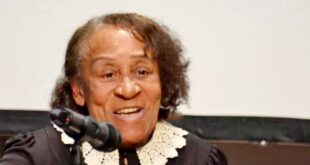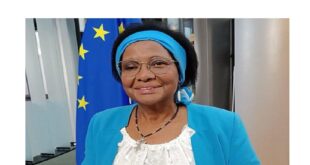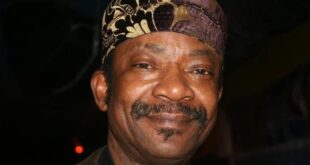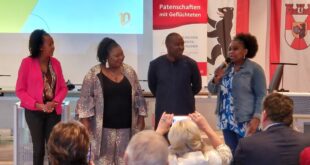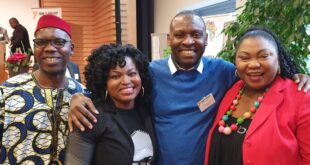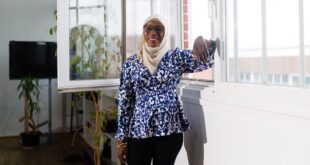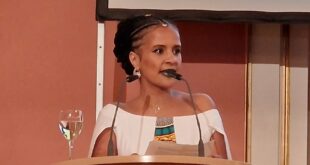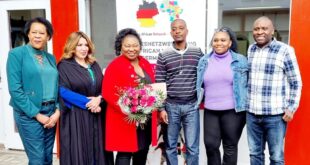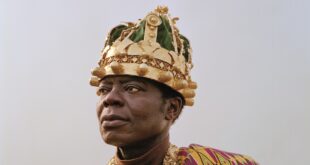Black Business Matters, a networking platform for entrepreneurs of African descent, took place in Berlin on Saturday (1 February) to mark the beginning of activities commemorating the 2020 Black History Month in the German capital.
The event, which was held at the premises of Each One Teach One (EOTO) in the Wedding district, was attended by young and not-so-young Black entrepreneurs who came together to share ideas and experiences and seek opportunities for collaboration.
In her opening speech, Maithy Mouné, convener of Black Business Matters, explained why the Black History Month is important. The Month celebrates both the past and present achievements of people of African descent all over the world. “Black achievements and inventions in Science, Medicine, Politics, IT, Economics and many other areas have been denied for too long. This is the time to recognise the central role of Blacks in History,” Ms Mouné said.
The entrepreneur revealed that she adopted the idea of the Black Business Matters from the US after experiencing how members of a business club in Germany she once belonged to operated. “Members of this association only did business with each other or with existing contacts in their environment,” she recalled.
Mouné, who is also the CEO of EOTO, said she convened the Black Business Matter in Germany for the first time in 2016 and since then the number of participants has been growing. The goal of the business club is to enable Black entrepreneurs and professionals to connect, network and create synergies among themselves. Therefore, creating business/working opportunities for one another.
The Black Community should emulate other communities such as the Turks and support our own communities, businesses in order to make an economic impact, she advised. “Others are getting stronger, we Black people should get together,” she said. “We’re role models for the coming generation; what we do now will guide those coming after us,” she added.
Several businesses and projects were presented at the event.
Femi Oyewole talked about how he started Black Brown Berlin a year ago. The company organises events while it also certifies other event locations where Black and Brown people can feel comfortable. “We make sure it’s a safe place,” he added, explaining the condition for events to be listed on his online platform. “Information is liberation.”
Kundai Chirunga also presented his novel app, Mavara, which exhibits artworks and photographs. “We want to change the conversation about Africa. We have to talk about the progress in Africa while wrestling with its challenges,” he said. His company Maisha Marefu will open a school in Berlin this year to teach African languages. Chirunga revealed that the first set of languages to be taught in the school would include Shona, Ndebele, Twi and Swahili. Other languages would be added as time goes on.
Sangano Hub Survey seeks to identify the challenges faced by Black people and find solutions to them, said Wadzanai Motsi-Khatai in her presentation. The online survey targets aspiring and active Black entrepreneurs and professionals in Germany to find the typical problems they face, she explained.
The initiative plans to set up an ‘Africa House’ in Berlin, a co-working space that will provide information, workshops, seminars on personal development and entrepreneurship, Motsi-Khatai revealed.
Joshua Kwesi Aikins and Muna Aikins jointly made a presentation on Afrozensus (Afrocensus), a survey of the experience of people of African descent in Germany.
Kwesi explained that the project’s practical aim was to provide a snapshot of the experiences of Black people to be able to identify the specific forms of discrimination affecting them. The result of the survey would then be used to advocate for change.
“To advocate for social change, you have to present data-based evidence,” he said, calling on members of the Black community to take part in the online survey and assuring that whatever information respondents provided could not be used against them since the data-gathering exercise was essentially anonymous. “We have to prove that the problems to which we’re seeking solutions do exist,” he added. “If you’re not counted, you don’t count.”
Muna added that the Afrozensus project, which is sponsored by the Anti-Discrimination Agency of the Federal Government (Antidiskriminierungsstelle des Bundes), would also enable the Black community to gain visibility as a group which is necessary for better representation of its interests.
The Black History Month Berlin is taking place throughout the month of February, featuring many activities, ranging from book readings to film screenings, from lectures to bazaars.
Femi Awoniyi
- For more information about Black Business Matters, contact: mmoune@hotmail.com
- For information on Black History Month Berlin, click here
- To participate in the Sangano Hub Survey, click here
- To visit Black Brown Berlin, click here
- For more information about the Afrozensus Survey, click here
 THE AFRICAN COURIER. Reporting Africa and its Diaspora! The African Courier is an international magazine published in Germany to report on Africa and the Diaspora African experience. The first issue of the bimonthly magazine appeared on the newsstands on 15 February 1998. The African Courier is a communication forum for European-African political, economic and cultural exchanges, and a voice for Africa in Europe.
THE AFRICAN COURIER. Reporting Africa and its Diaspora! The African Courier is an international magazine published in Germany to report on Africa and the Diaspora African experience. The first issue of the bimonthly magazine appeared on the newsstands on 15 February 1998. The African Courier is a communication forum for European-African political, economic and cultural exchanges, and a voice for Africa in Europe.


